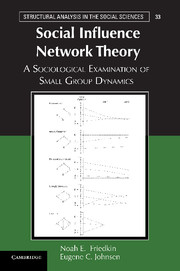Book contents
- Frontmatter
- Contents
- List of Tables and Figures
- Acknowledgments
- Preface
- PART I INTRODUCTION
- PART II INFLUENCE NETWORK PERSPECTIVE ON SMALL GROUPS
- PART III LINKAGES WITH OTHER FORMAL MODELS
- Epilogue
- Appendix A Fundamental Constructs and Equations
- Appendix B Total Influences and Equilibrium
- Appendix C Formal Analysis of Dyadic Influence Systems
- Appendix D Social Positions in Influence Networks
- Appendix E Goldberg's Index of Proportional Conformity
- Appendix F Gender-Homophilous Small Groups
- References
- Index
Preface
Published online by Cambridge University Press: 03 May 2011
- Frontmatter
- Contents
- List of Tables and Figures
- Acknowledgments
- Preface
- PART I INTRODUCTION
- PART II INFLUENCE NETWORK PERSPECTIVE ON SMALL GROUPS
- PART III LINKAGES WITH OTHER FORMAL MODELS
- Epilogue
- Appendix A Fundamental Constructs and Equations
- Appendix B Total Influences and Equilibrium
- Appendix C Formal Analysis of Dyadic Influence Systems
- Appendix D Social Positions in Influence Networks
- Appendix E Goldberg's Index of Proportional Conformity
- Appendix F Gender-Homophilous Small Groups
- References
- Index
Summary
Social influence network theory presents a formalization of the social process of attitude changes that unfold in a network of interpersonal influence (Friedkin 1986, 1991, 1998, 1999, 2001; Friedkin and Cook 1990; Friedkin and Johnsen 1990, 1997, 1999, 2002, 2003). In this book, we bring the theory to bear on lines of research in the domain of small group dynamics that are concerned with changes of group members' positions on an issue, including the formation of a consensus and of settled disagreement, via endogenous interpersonal influences, in which group members are responding to the displayed positions of the members of the group. Newcomb (1951) has suggested, and we agree, that the occurrence of endogenous interpersonal influence is among the basic postulates of social psychological theory:
Any observable behavior [e.g., a displayed position on an issue] is not only a response (on the part of a subject) which is to be treated as a dependent variable; it is also a stimulus to be perceived by others with whom the subject interacts, and thus to be treated as an independent variable.
(Newcomb 1951: 34)Social influence network theory advances a dynamic social cognition mechanism, in which individuals are weighing and combining their own and others' positions on an issue in the revision of their own positions. The influence network construct of the theory is the social structure of the endogenous interpersonal influences that are involved in this mechanism.
- Type
- Chapter
- Information
- Social Influence Network TheoryA Sociological Examination of Small Group Dynamics, pp. xv - xxiiPublisher: Cambridge University PressPrint publication year: 2011



